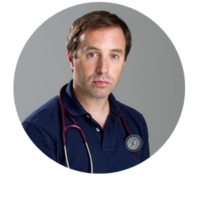Male Hormone Health
Written by Dr. Alan Farrell. Alan is an expert in Metabolic Health and Male Hormone Optimisation and is the founder of CDxP - Chronic Disease Prevention. Visit his website here www.cdx-p.com.


Male Hormone Health
Fatigue, loss of strength, weight gain, low mood, anxiety, loss of sexual desire and function. These are symptoms many people can relate to as they get older. Most of the time these symptoms are explained by ‘ageing’ and the idea that these symptoms are ‘normal’. But what if these symptoms are linked to a reduction in our most important male sex hormone, Testosterone?
Declining Testosterone Levels:
As we get older, it is natural for testosterone levels to drop, and there is an approximate 1% drop in Testosterone levels per year after age 30. We also know however that average Testosterone levels globally have dropped up to 20% in the last two decades. The precise reason for this is unclear, but it is likely down to toxins in our environment, poor nutrition and lifestyle choices and stress all leading to complex metabolic dysfunction.
Low testosterone levels can also co-exist and may indeed be a feature of certain chronic disease states such as Obesity and Type 2 Diabetes. That is why the management of low Testosterone levels should involve an overall holistic approach focusing on lifestyle intervention as well as Hormone replacement and optimisation.
Measuring & Treating Low Testosterone Levels:
Measuring testosterone levels is very easy, it requires a complete medical work-up looking for co-existing issues that can be addressed through lifestyle intervention, as well as a focus on some other important hormones and blood tests that can also explain some of the symptoms of low Testosterone.
The treatments for low testosterone like most areas of medicine are varied and favour a combination of both lifestyle interventions and medical therapies. Lifestyle interventions should always be considered and include Nutritional Strategies, Appropriate Exercise, Supplementation (Vitamin D, Magnesium, Zinc), Improved Sleep, and Stress Reduction.
In many instances Lifestyle intervention may not be enough to improve the symptoms of low testosterone and your GP or Specialist may recommend therapies i.e. Testosterone Replacement Therapy (TRT). These therapies can take the form of:
- Topical Gels
- Intramuscular Injections such as Testosterone Undecanoate every few months
- Regular subcutaneous injections given 2-3 times per week (self-administration)
I favour a micro-dosing regimen allowing more frequent smaller doses and allowing for more stable and regular blood concentrations. The key is to alleviate the negative symptoms of Testosterone Deficiency with the lowest and safest dose.
If you can relate to these symptoms and have not yet had a clear explanation as to why they occur, you should discuss these with your Health Care provider, GP, or a specialist clinic. A simple Questionnaire can be your first and most important step to address this often-fixable condition.
